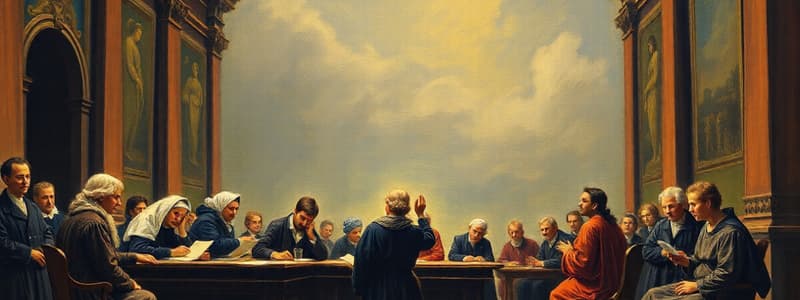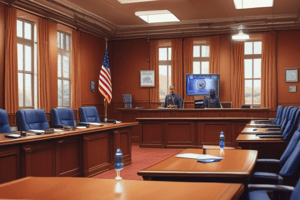Podcast
Questions and Answers
What are local rules primarily designed to achieve in courts?
What are local rules primarily designed to achieve in courts?
- To manage caseloads and ensure fair case handling (correct)
- To eliminate the need for state laws
- To set penalties for misconduct
- To comply with federal regulations
Which of the following is a key characteristic of local rules?
Which of the following is a key characteristic of local rules?
- They vary from one jurisdiction or judge to another (correct)
- They must conflict with state and federal laws
- They are only relevant to federal courts
- They are adopted uniformly across all jurisdictions
What happens if there is a conflict between a local rule and a state or federal rule?
What happens if there is a conflict between a local rule and a state or federal rule?
- The state or federal rule usually prevails (correct)
- The case is dismissed automatically
- The conflict leads to court sanctioning the local rule
- The local rule prevails in all cases
Which topics are typically covered by local rules?
Which topics are typically covered by local rules?
What is the role of a General Order in a court context?
What is the role of a General Order in a court context?
What may happen if a party fails to comply with local rules?
What may happen if a party fails to comply with local rules?
Where can one typically find a complete list of local rules?
Where can one typically find a complete list of local rules?
Local-local rules primarily refer to what type of procedures?
Local-local rules primarily refer to what type of procedures?
Study Notes
Local Rules
- Local rules supplement general federal or state rules of procedure.
- They apply to specific courts.
- These rules cover a wide array of subjects, like pleadings' format, filing schedules, discovery, and dispute resolution.
- They might also include procedures for setting trial dates and presenting evidence.
Local Rules: General Orders
- Typically a court order, not an individual judge's,
- Applies to all, or a broad category, of cases in that court.
- Sets up court-wide policies and procedures, establishing holidays or handling administrative matters impacting the entire court's docket.
- Applies to everyone, not just parties in a specific case.
Local-Local Rules
- "Internal operating procedures" within a court.
- More specific than local rules.
- Can affect a particular courthouse, department, division, or individual judge.
- Cover specifics like the days and times a judge hears certain motions.
- Detail scheduling procedures, and judge's expectations in courtrooms.
- May cover things like specific days and times for hearings, conference procedures, or attorneys' conduct in court.
Standing Order
- Issued by individual judges.
- Applies to all, or specific categories of cases, under that judge's docket.
- Detail the judge's expectations of courtroom conduct by attorneys.
- Set clear procedures for filing/serving documents.
- Define other rules and policies for cases before that judge.
- Remain active until changed by the judge.
58 California Counties
- Superior courts in each of the 58 California counties have adopted respective local rules.
Links to Local Rules
- https://www.courts.ca.gov/3027.htm (VPN required)
- https://plus.lexis.com/toc/?pdmfid=1530671&crid=12bc62a9-4bfa-4b97-965a-f16528c8a878 (VPN required)
- Additional links to local rules accessible on official court websites.
Studying That Suits You
Use AI to generate personalized quizzes and flashcards to suit your learning preferences.





